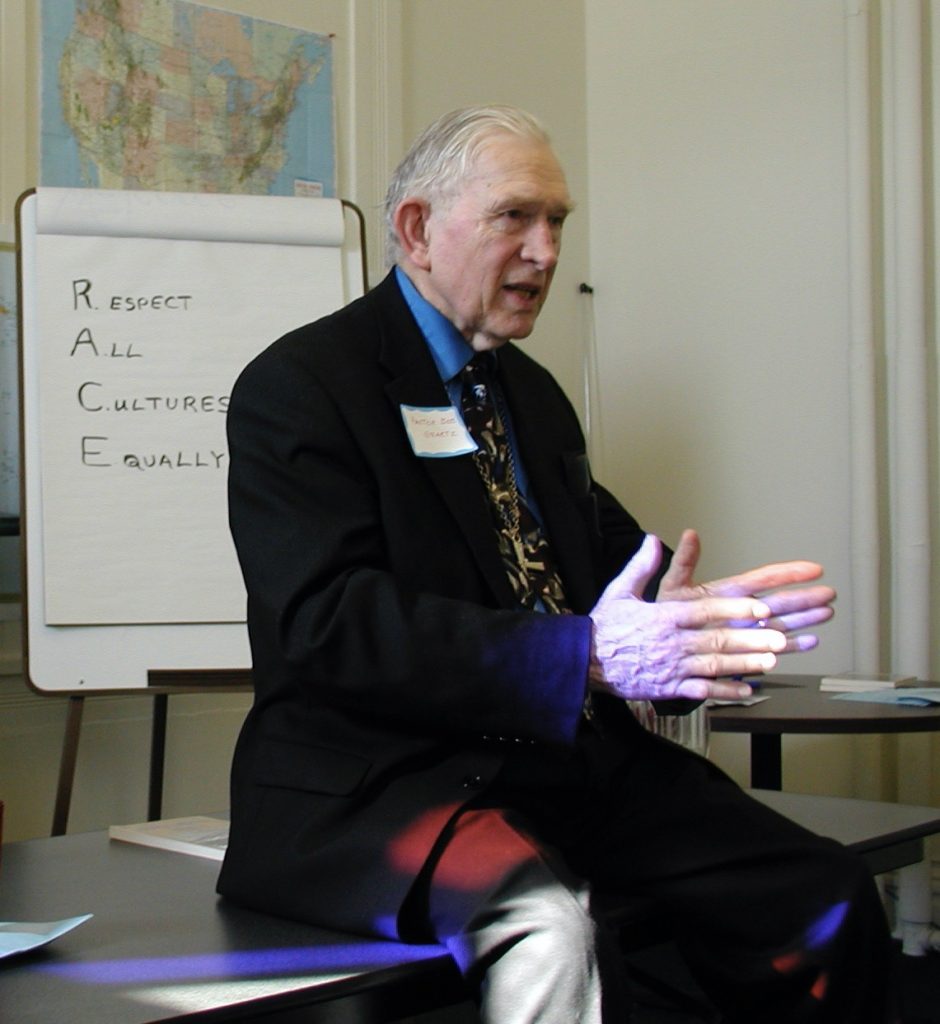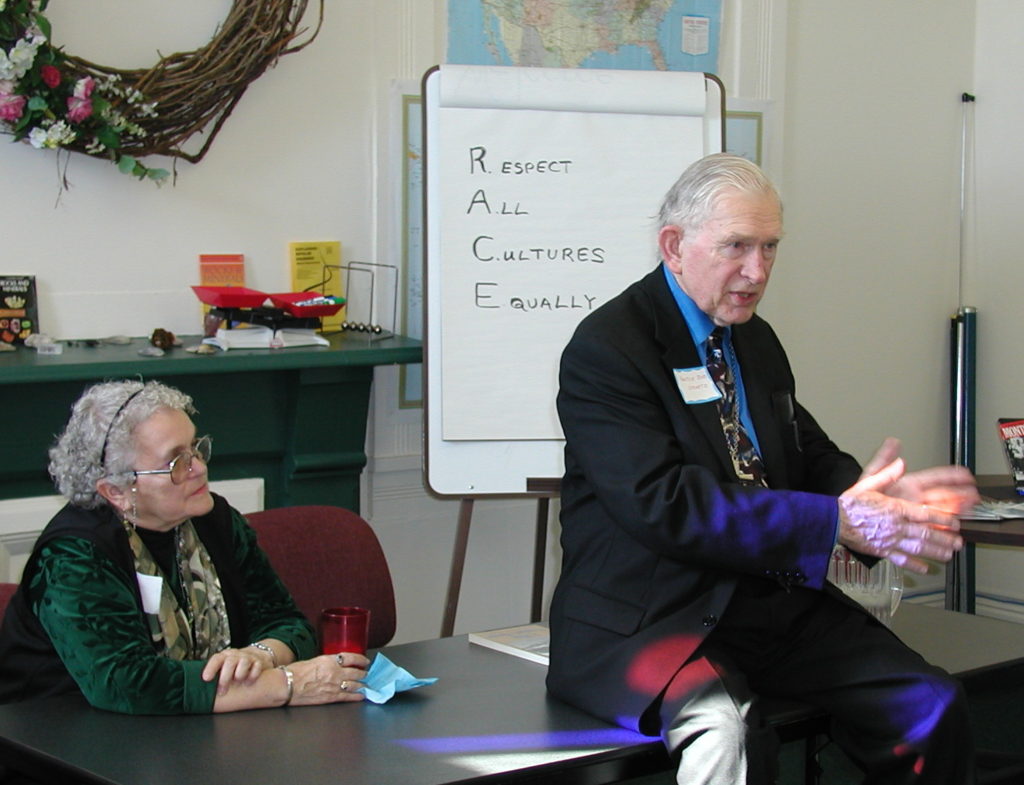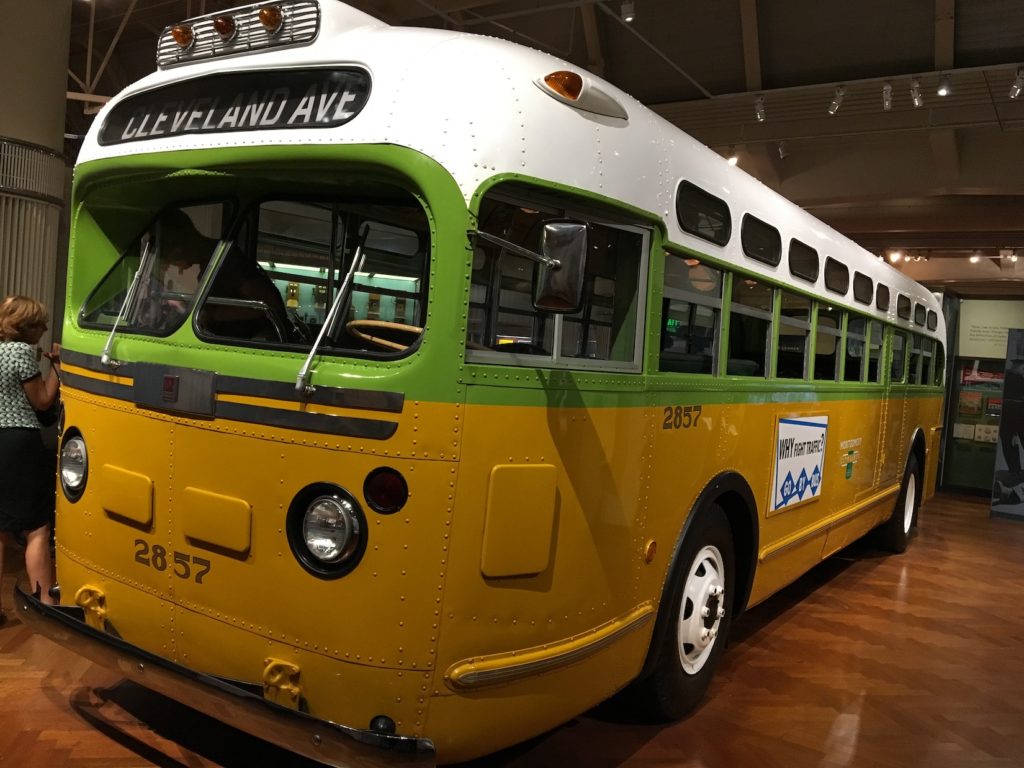
Photo: Mary van Balen
Rev. Robert S. Graetz, civil rights activist and the sole White minister to publicly support the Montgomery bus boycott, died at his home on Sunday, September 20,2020. He was 92. You can read about his life and his and his wife, Jeannie’s life-long commitment to work for social justice in the many obituaries and articles in the Washington Post, the New York Times, NPR Newsletter, and other publications.
In 1955, the newly ordained a Lutheran minister (attended the Evangelical Lutheran Theological Seminary in Columbus, Ohio, now Trinity Lutheran Seminary), accepted a call to the all-Black Trinity Lutheran Church in Montgomery. Already active in civil rights causes, he was admonished not to start trouble. He and Jeannie would later say he didn’t start trouble; he just joined it.
I want to share a small, personal story – one that didn’t make news but that touched hearts.
First, so you know a bit about Bob if you don’t already, here are a few facts:
- He was the only White pastor to publicly support the Montgomery bus boycott, tirelessly driving Black workers to and from work for the duration, organizing, and fund raising to support that effort.
- He, Jeannie, and their family of young children were targets of the KKK and other White supremacists who found a White man’s commitment to working with Blacks for their civil rights intolerable.
- The Graetz’s survived bricks through their windows and house bombings (saved once when a large bomb that could have leveled the neighborhood failed to detonate).
- Their neighbor and friend, Rosa Parks swept up the glass in their kitchen and took up a neighborhood collection to replace the Graetz’s dishes, all broken in one of the explosions.
I encourage you to read stories of Bob and Jeannie and their courageous commitment to live out their faith, no matter what. But now, my story.
Meeting a fellow columnist
I first met Bob at a 1992 alternative commemoration of the 500th anniversary of Christopher Columbus’s landing on the shores of the Americas. Presented by indigenous peoples, the multi-day event was held in downtown Columbus, Ohio. I was covering it for the Catholic Times, where I was a columnist. Bob was there, too.
He had been writing for years for the same paper, contributing to the feature “Point of View’” that provided insights from other spiritual traditions. I enjoyed his unique perspective and remember reading about their small house in southern Ohio, that for a while, had no electricity or running water! Recognizing him at the gathering, I called out his name, and we made plans for lunch. During our conversation, he referenced a recent column he had read in the Catholic Times and wondered, hoped, that I had written it.
I had. It presented the confusing stance of the Catholic Church on ordaining married men. As recent events had indicated, it was ok if the man had not started out Catholic, had been ordained in another denomination, but then converted to Catholicism. No such luck if you happened to be Catholic all along. Still baffling.
Bob and I stood on common ground. Over the years, I ran into him when he spoke at gatherings on Martin Luther King Day, or I’d see him at his book signings.
Speaking to my students
In 2005, I gave him a call and asked if he’d be willing to speak to my class of adult students in Even Start, a family literacy program that served low income families most in need of services. He and Jeannie were happy to come around Martin Luther King Day. It was a big event for us.
Our students invited the mayor and others in the community and planned refreshments. In class, we studied the Montgomery bus boycott and the civil rights movement and read sections of Bob’s book, Montgomery, A White Preacher’s Memoir.
The big day arrived, and Bob and Jeannie spoke to a group that included our students and staff, the mayor, leaders of the very small Black community in our city, a newspaper reporter, and a few other guests. The Graetzs shared their experiences and spoke eloquently about not only the Montgomery bus boycott but also the continued struggle for civil rights on many fronts: racism, sexism, discrimination against the LGBT community, and the increasing economic disparity between the rich and the poor.
The students were riveted, listening to every word, and as I would discover later, also watching every move.

Photo: Mary van Balen
The cough drop
When the talk ended and time had been given to answering questions, everyone mingled, enjoyed the snacks, and had pictures taken with our guests. Cleaning up our classroom after the event, my students started talking.
They were impressed that Bob and Jeannie stood up for other people when they didn’t have to. They were White. They could have moved somewhere else, they said. But The Graetzs stayed and put their lives on the line.
The students kept talking.
“Did you see how she took care of him? How she slid that cough drop across to table to him when he started coughing?” “Yeah,” someone answered. “You can tell, they really love each other. That was so cool.”
“Really,” I thought to myself. “A cough drop?” That such a simple act of thoughtfulness had captured the students’ attention pierced my heart with the realization that they likely had known precious little, if any, of such kindnesses in their lives. Why else would Jeannie’s sharing a cough drop have made such an impression?
Most had grown up in abusive homes. Some were in abusive domestic relationships at that moment. A number of them struggled with addiction. They had all slipped through the cracks of our education system. And while none were Black in our almost all-White community, they knew generational poverty, discrimination, and the hopelessness they engender.
As we finished up, one of the students suggested going to Columbus that Sunday when Bob would be preaching. “Yeah, can we take a trip up there? I want to hear him preach.” Not many attended church, but they all wanted to go.
Unusual field trip

On display in the Henry Ford Museum
Photo: Mary van Balen
So we did. A conspicuously White group in that Sunday gathering, we attended the service and heard Bob preach. In the course of the sermon, he asked questions about the bus boycott. My students waved their hands in the air. He smiled and joked that he wouldn’t call on them since he was sure they knew the answers.
They were thrilled. I doubted they had heard those words very often during their school years. But in that moment, they were the ones “in the know.” They glowed on the way home.
That was years ago. Not too long after that, our program closed, having lost its funding. Occasionally, one of our Even Start staff hears from a former student, but that isn’t often. I once received a thank you letter from a young woman we helped escape from her abusive husband, taking her children with her.
Small acts of kindness – courage
We don’t know what effect our work, let alone our small actions or off-hand comments have on others. Today, as I read about Bob’s amazing life and work for social justice, I thought about Jeannie and the cough drop. Of all the things that couple has done in their lives, I’m sure some of my students, to this day, remember the cough drop, right alongside the couple’s courage and faithfulness in the face of injustice.
Today, we face the real danger of losing our democracy to a leader focused on retaining power at any cost. He has plenty of enablers. Building on fear, fomenting anger, violence, hatred, and divisiveness seem the modus operandi.
Centuries-old systemic racism is increasingly uncovered. Consequences of a warming climate are ravaging the globe. And the pandemic adds another layer of suffering and complication to it all.
What can I do? I struggle with this question. I write columns and postcards to voters. I wear a mask, inside or out of public buildings. I try to be thoughtful and kind in the interactions I do have with others. I pray, trying to remember that I am not alone in this walk, that the Holy One, as well as other human beings, are with me in it.
Will I be as courageous as the Graetzs if I’m called to publicly stand up against injustice? Will I find strength in faith?
I’m not sure. But I know, such courage doesn’t just “appear” in a moment. It is something we nurture throughout our lives: with prayer, in our actions large and small. They are related. I remember that the couple who braved threats and bombings also noticed simple needs. They slipped a cough-drop across a table.
© 2020 Mary van Balen
Books by Rev. Robert Graetz
A White Preacher’s Memoir: The Montgomery Bus Boycott (first published as Montgomery: A White Preacher’s Memoir)
I have always contended that the absence of fear is not the point. What you do when you are afraid is what makes the difference. We often had good reason to be afraid.
Rev. Robert Graetz




